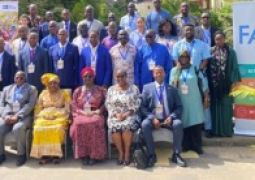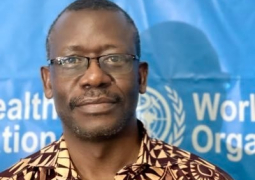
This discussion comes as a result of the arrest of three practitioners at Niani Bakadaji which unleashed a plethora of debates among religious leaders, National Assembly Members, activists, and regular citizens alike. Religion and culture became key indicators as think-pieces flooded every nook and cranny of the nation to either reaffirm or rattle beliefs and customs. In times like this, certainly, people look towards leaders who are well aware of what needs to be implemented and what not, to foster peace and development.
When questioned about the Islamic stance on FGM/C as a whole, Imam Taib Kah, a renowned Islamic scholar took a quick voyage down history lane to speak of its origins. Imam Kah began by signifying that the practice first saw life in Egypt, Africa during the era of Pharaoh Ramesses II, a conqueror who often went on battles that would last six months at a time and once he journeyed home his soldiers would find that their wives and daughters had been defiled and impregnated. They relayed their distress about such happenings to their Pharaoh who then made a declaration to have the labia and clitoris of the women cut off and their genitals sewed close with only a space to urinate spared to refrain them from engaging in fornication. “FGM existed in Egypt 700 years before the advent of Islam, travelled to Sudan, Chad, Ethiopia, Eritrea, and Somalia and made its way to central Africa and eventually in The Gambia through the Fula tribe, thus Islam didn’t bring it. Islam found it here.” He relayed with utmost conviction. Imam Kah walks down quite a technical path following this to shed light on the Prophet’s (S.A.W) ruling on Female Circumcision. “Prophet Muhammad S.A.W stated that while male circumcision is obligatory, female circumcision is neither an obligation nor a Sunnah but rather a ‘Teranga’ (blessing) that if you cannot abstain from it, you must simply nick off a part of the clitoral hood that is almost as small as the edge of a needle.” He said and continued to explain that the practice is called Teranaga by the prophet because that minuscule part of the clitoral hood holds extreme desire and nicking it off means moderating that desire. “Islam frowns upon whoever performs an act of cutting off either or both Labia and the clitoris as this prevents a woman from experiencing marital pleasure and the ease that comes with uninterrupted natural birth.” Imam kah lands his statement on the issue by advancing that Islam advocates nothing that causes bodily harm and places heavy emphasis on the practice of FGM/C being a tradition that originated from Egypt and was initiated and practiced by a ruler that wasn’t Muslim.
A genteel woman who experienced the practice at a tender age and wished to remain anonymous harbored a bout of words she desired to share about the idea of the FGM/C law being repealed. “I believe it to be something really good, that ex-president Jammeh carried out a ban in 2015 because young girls go through severe pain due to FGM, some of whom are circumcised at a mere week old.” She stated and goes on to advance that she recognizes the pain quite well and recalls how much of a hurdle it is as they are not allowed to use water after the practice until the wound heals and this, she confesses, brings about “a horrible unpleasant odor” during the healing process. She further goes in-depth and makes it known that subsequent to the circumcision there is something placed inside you (this practice is not part of FGM/C. This can be done without FGM/C), promised to keep you chaste until the day you marry where it is removed to allow you the possibility to consummate your marriage. “They will remove it with a razor blade or something sharp which means there is a second round of pain for us that went through the first process.” She professed and continued ahead to relay that “Gambians should not practice FGM at all, as for me, even if I had female children I would not let them go through that pain.”
Gambia women's rights activist and anti-female genital mutilation campaigner Jaha Dukureh grows statistical and conveys that 76 percent of Gambian women have been subjected to FGM/C; passionate about the notion as a whole, Jaha signifies that seeing as a lot of organizations including her own invest a lot of time and effort to ensure that FGM/C doesn’t prevail, she is disheartened at the thought of the Ban being reversed and believes it to truly be a sad moment in the history of Gambia as a country. “My sister died as a result of FGM/C and today there are millions of women around the world who are having marital issues and dealing with infections daily as a direct result of the practice. The majority of those promoting its continuation are men and they need to comprehend that Male circumcision cannot be compared to female circumcision because if you do, it’s almost like comparing it to if you cut off the entire genitalia of a man.” She said.
Jaha also shared her thoughts on religion being used as a key reference and advances that when people don’t know what to do, they always go to religion as a fallback plan.” FGM was already being practiced when Islam came, we have countries like Saudi Arabia, Kuwait, Qatar, and Dubai that are all predominantly Muslim nations but don’t practice FGM, thus why should we be made to believe that we understand Islam more than these nations?” Jaha questioned and also debunks the idea that anti-FGM agendas are Western driven “I am the biggest Pan Africanist I know, I love Africa and I love my country, and I am not doing this to promote any Western agenda. It is quite sad that our people think that we don’t have the minds to think for ourselves and stand up for our people.” Jaha states that this is not a battle and asks for people to listen with an open heart and empathy as speaking up against repealing the law is not a fight against Islam but a fight to protect women and girls in Gambian communities.
Dr. Muhammad Jallow, a healthcare professional, glazed over some of the complexities individuals who have gone through FGM/C experience all spanning short and long-term difficulties making mention of painful urination due to obstruction of the urethra, Dysmenorrhea (difficulty in passing menstrual blood) and the spread of harmful infections that can be as a result of unsterilized materials. “They can experience sexual complications such as heavy pain during intimacy, childbirth complications such as postpartum hemorrhage, lacerations, neonatal death, and difficult labor, as well as mental health problems like post-traumatic stress disorder, anxiety disorders, depression, and somatic complaints.” He stated and signified that FGM/C has no health benefits and harms girls and women in plentiful ways. Dr. Jallow described the practice to be “a harmful practice that is unacceptable from human rights’ as well as a public health perspective.”
Read Other Articles In National News





